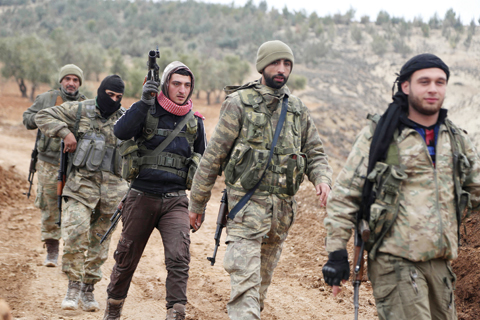UN hosts 'critical' Syria peace talks in Vienna
 KILIS: Turkish-backed Syrian rebel fighters are seen in the area of the Barsaya Hill, which overlooks both the Syrian town of Azaz, which is held by pro-Ankara rebels, and the Turkish town of Kilis just across the border, on Wednesday. — AFP
KILIS: Turkish-backed Syrian rebel fighters are seen in the area of the Barsaya Hill, which overlooks both the Syrian town of Azaz, which is held by pro-Ankara rebels, and the Turkish town of Kilis just across the border, on Wednesday. — AFPJANDAIRIS, Syria: His house was damaged by Turkish bombardment and most neighbors have fled, but elderly Abu Jiwan says he refuses to abandon his northern Syrian hometown as long as he's still breathing. With a traditional red-and-white Kurdish shawl wrapped around his head, the 70-year-old gestured towards his home in the town of Jandairis, freshly hit by Turkish shelling. "I won't leave Jandairis as long as I'm alive," he said in Kurdish.
"Where would I go? There are no roads. We don't have diesel or a car. Where can we go when all the roads around us are cut?" Turkish forces and allied Syrian rebels are waging an offensive against Afrin, an enclave in northern Syria controlled by Kurdish militia.
For nearly a week, Turkey has launched air strikes, rockets and artillery fire at Afrin in a bid to oust the Kurdish People's Protection Units (YPG). Jandairis, a town in the district's southwestern corner, has been heavily targeted by Turkish air strikes and rockets as it sits close to the border and near a front line with pro-Ankara rebels. Bombing on Wednesday battered Jandairis, leaving Abu Jiwan's home and his farming tractor in ruins.
"God help us. God be kind to us," he said, shaking his head.
'We are all with you'
Rubble is piled up in many of Jandairis's streets and the town's petrol station has been bombed out of service. The United Nations said it has received reports that around 5,000 people have been displaced by the ongoing offensive, mostly within the enclave.
Most of Jandairis's residents have sought refuge elsewhere, but those that could not find a way out are taking cover from Turkish bombing however they can.
A journalist contributing to AFP saw more than two dozen people, including children, waiting out the shelling in a dimly lit cellar.
The United Nations embarked on fresh efforts yesterday to jump-start Syrian peace talks that Western countries and the opposition fear are being undermined by a separate Russian diplomatic push. The two days of talks in Vienna come after eight previous rounds in Geneva, during which the two sides failed to even meet each other. The previous attempts stumbled in particular over the fate of Syrian President Bashar al-Assad, with the government delegation refusing to meet the opposition face-to-face until they drop demands that he leaves office. The Syrian government's top negotiator Bashar Al-Jaafari made no comment as he arrived at the UN in Vienna to meet the world body's special envoy Staffan de Mistura.
The main opposition group, the Syrian Negotiations Commission (SNC), said it would sit down for separate talks with the envoy at 4:00 pm (1500 GMT). De Mistura said on Wednesday that the negotiations came at a "very, very critical moment".
Nasr al-Hariri from the SNC said the discussions would be "a real test for all the sides". French Foreign Minister Jean-Yves Le Drian said meanwhile in Paris that the talks were the "last hope" for reaching a political solution to a seven-year conflict that has claimed more than 340,000 lives.
He highlighted a "considerable worsening of the humanitarian situation" in Afrin-where Turkey has launched an operation against Kurdish fighters-as well as in Idlib and Eastern Ghouta.
The Turkish intervention, its second in a conflict that has drawn in multiple world powers, has heightened tensions with Ankara's NATO ally the United States, which has backed the Kurdish militants in their battle against the Islamic State group.
Ankara, in contrast, views the Kurdish YPG fighters as a Syrian offshoot of the outlawed Kurdistan Workers' Party (PKK), which has waged a three-decade insurgency against the Turkish state.
Parallel peace talks
The Vienna talks come ahead of a separate peace conference next Tuesday in the Russian Black Sea resort of Sochi, backed by Russia, Iran and Turkey. The three key regional players have been sponsoring parallel peace talks since the start of last year, which have fuelled concerns that the Kremlin is looking to sideline the UN.
"The Russians have done everything to weaken the Geneva process. They want to short-circuit it and be the only sponsor of the diplomatic process," said Hasni Abidi from the CERMAM think-tank in Geneva. The focus in Sochi will be on hammering out a new constitution, according to the opposition, something that de Mistura also wants discussed in Vienna. While Assad's government has said it will go to Sochi, the SNC has not yet decided, even after a recent visit to Moscow. - Agencies










